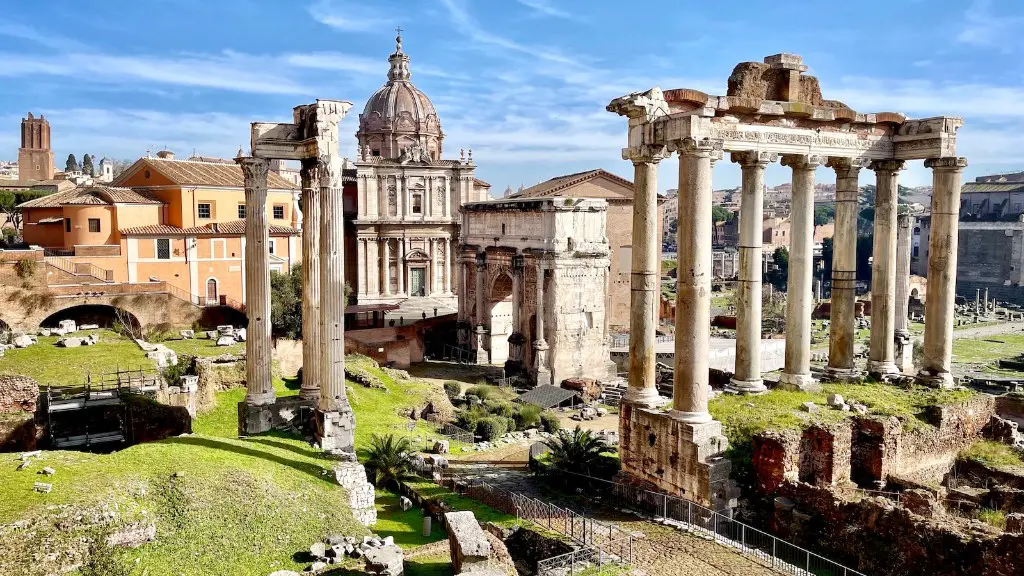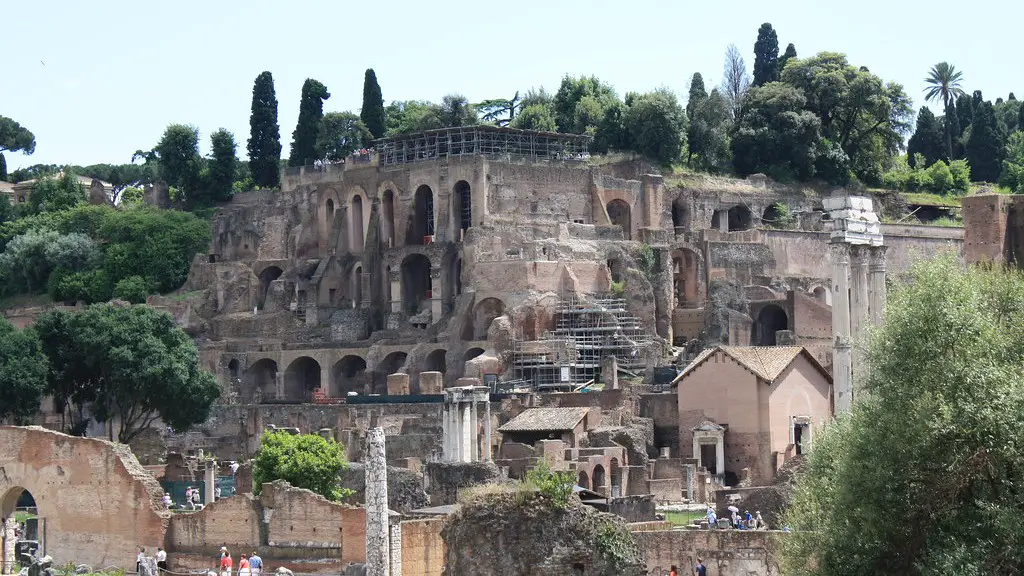Types of crimes committed in Ancient Rome
While many crimes were punishable by death in Ancient Rome, it was a complex system of criminal law that differentiated between various levels of intentional and negligent criminal behaviour. Crimes committed in Ancient Rome ranged from everyday nuisance and public disorder to treason and other high-level offenses.
One of the most severe punishments for ordinary crimes was that of exile and confiscation of property, which could be avoided if the accused was able to pay a fine instead. Some common offenses included arson, theft, assault and murder, but punishments also differed according to the status and social class of the accused. Penalties for the upper classes were usually much lighter than those of the lower classes, and depending on the severity of the crime, death sentences could be imposed.
By today’s standards, the penalties for trivial offenses in Ancient Rome were quite severe. For example, defacing statues of gods or the emperor was a crime punishable by death. It was illegal to challenge senators and jurors, and even to bear false witness. Violations of religious laws and customs could also be severely punished, as could abduction and kidnapping.
Bribery and corruption were also seen as highly offensive, and treason was considered to be the most horrible of crimes. Additionally, adultery, libel and insulting in poetry were also punishable by death. Adultery, in particular, was a crime which was seen as jeopardizing the unity of the country, and was therefore severely punished.
Punishments for crimes in Ancient Rome were usually quite harsh and could vary in severity according to the status of the accused. The death penalty was often used for serious offenses, but for many other crimes, exile and confiscation of property was the main punishment. Low-level offenses were usually punished with fines, while corruption and bribery were often dealt with in a more lenient manner.
Fuel Theft
Fuel theft was a significant problem in Ancient Rome and was punishable by confiscation of property, exile and/or a prison sentence.The motive for this type of crime was purely economic: since they had limited access to fuel sources and needed the fuel for essential tasks like cooking and heating, stealing was seen as the most effective way of ensuring their family’s supply. Punishment for this crime was severe and could involve confiscating the thief’s property, imprisoning them, and also forcing them into exile.
However, although the punishment for this crime was harsh, it did not seem to serve as a deterrent, as the crime rate stayed fairly high. This may have been due to the fact that fuel thieves were often willing to take risks in order to improve their family’s situation. In some cases, offenders were even able to successfully bribe their way out of these punishments.
A contributing factor to fuel theft in Ancient Rome was the highly unequal power dynamics between the rich and the poor. Since the wealthy had greater access to fuel sources, they were able to leverage their economic power over the impoverished and marginalised groups. This created a situation in which the lower classes were more likely to resort to desperate measures like fuel theft in order to survive.
Interestingly, fuel theft was not always seen as a criminal act. In some cases, it was considered to be a legitimate source of income since many wealthy landowners were willing to pay a premium for stolen fuel. This created a situation in which many people were willing to take the risk of fuel theft in the hopes of making a profit.
Overall, fuel theft was a significant issue in Ancient Rome and was punished harshly. Despite this, the crime rate remained fairly high due to the unequal power dynamics between the wealthy and the poor, and the potential to make a profit from stolen fuel.
Political Unrest
Political unrest was a significant issue in Ancient Rome and could lead to criminal charges. Protesting of any kind was seen as a criminal offense and could result in a prison sentence. This was especially true for dissenters who had voiced their critiques of the government or the emperor. Punishment for this type of crime could involve both corporal and capital punishment.
Those who committed acts of political rebellion were often branded as traitors and had their property confiscated. In some cases, they were even forced into exile. However, not all forms of protest were viewed as criminal. Those who protested peacefully were rarely charged with a crime.
Political rebellion was often a reaction to oppressive conditions and unequal power dynamics. The unequal distribution of wealth among the classes was a key contributing factor to the level of unrest in Ancient Rome. People were often discontented with their circumstances and were willing to risk their lives in order to fight for a better life.
The government’s response to these protests was usually swift and harsh. Dissenters were quickly quashed and dissidents were publicly humiliated. This was done as a means of discouraging others from speaking out against the government. This type of repression created an environment of fear in which people were hesitant to voice their grievances.
Overall, political unrest was seen as a criminal offense in Ancient Rome and punishable by harsh punishments. While peaceful protests were often met with leniency, those who spoke out against the government or the emperor were quickly silenced. The unequal power dynamics among the classes contributed to the high level of political unrest in the region.
Cruelty to Slaves
Cruelty to slaves was a common occurrence in Ancient Rome and was generally accepted as a normal part of life. Slaves did not have the same rights as free citizens and were vulnerable to unimaginable acts of violence. It was not uncommon for masters to inflict physical and mental pain on their slaves without any legal repercussions.
The punishments for this type of crime could range from fines to imprisonment and in some cases, even exile. However, since the majority of slave owners were wealthy and powerful, they were rarely charged with a crime. This meant that there was little deterrence for those who were inclined to treat their slaves cruelly.
The unequal power dynamics between masters and slaves enabled slave owners to commit shocking acts of violence with impunity. Slaves were seen as property and had no rights or protection. This created an environment in which abuse of slaves was seen as normal and accepted.
These unequal power dynamics were further compounded by the subjugation of women and other non-elite groups. This meant that these individuals were even more vulnerable to abuse and exploitation. This created an incredibly oppressive climate in which abuse of slaves was both common and accepted.
Overall, cruelty to slaves was a common occurrence in Ancient Rome and was generally accepted as a normal part of life due to the unequal power dynamics between masters and slaves. Punishment for this type of crime was generally light and this may have served as an incentive for those who wished to abuse their slaves.
Punishments for Crimes
The punishments for crimes varied greatly in Ancient Rome depending on the severity of the crime and the status of the offender. The majority of offenses carried a fine, while the most severe offenses could lead to the death penalty. Exile, confiscation of property and imprisonment were also commonplace punishments.
The death penalty was reserved for those convicted of the most serious offenses, such as treason and murder. However, it was also possible for those accused of minor offenses to face the death penalty if they could not pay the fine. Punishments for treason were often more severe than those for other crimes.
Those in positions of power were often treated with leniency and could often get away with lighter punishments. Bribery and corruption was also seen as acceptable in certain circles, and those who had the means to pay the fine or bribe their way out of punishments were often able to do so.
Exile was viewed as the most severe punishment for everyday crimes. Exile usually resulted in the offender being removed from their home and forced to move to an unfamiliar place. This punishment was often seen as a deterrent and could have an incredibly disruptive effect on the offender’s life.
Overall, punishments for crimes in Ancient Rome varied depending on the severity of the crime and the status of the offender. The death penalty was reserved for the most serious offenses while minor offenses could be avoided if the accused had the means to pay a fine. Exile was often seen as the most severe punishment for everyday crimes.





